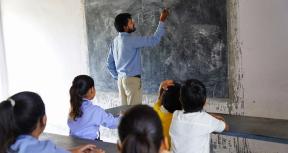The Organization for Economic Cooperation and Development (OECD) Development Assistance Committee (DAC) Network on Development Evaluation -- or EvalNet as it is known among evaluation cognoscenti -- celebrated its 30th anniversary in June 2013. We should all lift a glass to toast this important network, which plays a central role in sharing evidence on results of international development co-operation to support learning and help hold decision makers to account.
As we celebrate 30 years of EvalNet’s achievements, lets also pause and imagine where we will be in 10 or 20 years from now! I want to highlight five things that will be instrumental over this period.
We will see in partner and client countries more and more robust evaluation professionals, which will be better networked into a global community. Making sure we are one community rather than a fragmented lot of different ones, and that while respecting the diversity of composition and needs of different groupings, will be a challenge. This Network, through its evaluation capacity development work that also reaches across the community to the Banks and Foundations through the Regional Centers for Learning on Evaluation and Results (CLEAR Initiative) and the embrace of EvalPartners to the United Nations and non-government organizations, is well placed to play a role that we all need to assume.
Likewise, becoming a profession will require internationally agreed and accepted professional standards and a process of accreditation. This is nothing new: I can recall the debates of the early 1990s, when time was not ripe to form and agree on those standards. Today, a number of groups are engaged in defining competences. To truly strengthen the profession we need to bring these efforts together to a global consensus, as otherwise we will suffer greater fragmentation.
In terms of methodology, great advances have been made in many fields, and the arrival of “big data” that gets generated “automatically” expands our fount of information for use in evaluation. I would challenge us too, to look more closely at how we evaluate capacity development. This has always been considered the highest priority in the development discourse. Yet, across all organizations, the same mistakes are repeated, both in the design, doing, and evaluating thereof.
The other methodological challenge, we will need to tackle is that of complexity. This science is “complex” and quite often a bit wooly, because it does not follow our linear thought or speech patterns. The logical framework approach has been instrumental in shaping evaluation approaches. It explains cause and effect and is meant to help planners as much as implementers and evaluators. We all have seen the challenges in coming up with good frameworks and the dire consequences when they were missing. Going forward, we need to develop the mindset and the tools to make evaluative sense of the much more complex, intertwined and dynamic reality we live in. (Richard Straub of the Harvard Business Review wrote an interesting piece on complexity.).
And finally, our influence. We are evaluators not just because we like the research and the digging into data, or because we like the odd fight we can get out of an evaluation when we hit a raw nerve. Primarily, we do this work because we want to influence change and ensure our institutions do better, learn, grow and serve their clients. The disciplines of behavioral science and psychology can teach us some important lessons: people learn better when they feel good about themselves. We humans are less rationale than economic theory thought and therefore act on feelings and sometimes contrary to what facts should make us do, and incentives of carrots and sticks work when people do simple tasks and fail when they are engaged in complex pursuits. Now, imagine a shift that takes our institutions away from a culture of blame to one that strives for excellence and is inspired by continuous learning – and evaluation playing its part to make that happen.








Comments
Add new comment